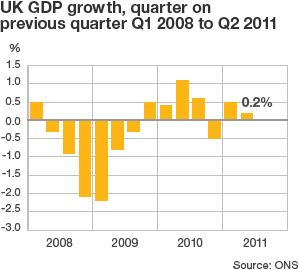The Cameron government’s austerity plan in the UK is near its one-year anniversary, and its effects continue to exactly match the prediction that any decent Macro 101 student could provide as the correct answer to a final exam question:
UK GDP figures show slower growth of 0.2%
Growth in the UK economy slowed in the three months to 30 June, partly because of the extra bank holiday in April. Gross Domestic Product (GDP) grew by 0.2% in the second quarter, according to the Office for National Statistics, down from 0.5% in the previous quarter.
…Chancellor George Osborne said the growth was good news, but Ed Balls accused him of choking the recovery. “The positive news is that the British economy is continuing to grow and is creating jobs,” said Mr Osborne.
…But shadow chancellor Ed Balls said that the slowdown was a serious problem for the government and it should take steps to boost growth.
“These figures show that last year’s recovery has been recklessly choked off by George Osborne’s VAT rise and spending review,” he said. “The economy has effectively flat-lined for nine months and this is very bad news for jobs, living standards, business investment and for getting the deficit down.”
…The think tank the Institute for Public Policy Research (IPPR) was also critical of the level of growth. “Last June, the OBR [Office for Budget Responsibility] predicted GDP would grow by 2.6% in 2011, but even if the economy gets back on track in quarters three and four this year, it will barely reach 1.2%,” said IPPR director Nick Pearce.
It’s not mysterious: when you raise taxes and cut government spending, growth slows. And when you do that during a very fragile and weak recovery, you can push your economy back into recession, or at best, choke off growth almonst completely. That’s exactly why, as has been extensively written about both here and elsewhere, austerity during a time of economic weakness is not a good way to beat a budget deficit, and will be largely self-defeating.
And NO, in answer to the various comments and emails that follow every time I make this point: this doesn’t mean that I think we should always and endlessly expand government spending. It just means we should expand government spending when economic growth is weak and unemployment is a problem. And that appropriate expansionary policies will reduce unemployment, improve income, and also effectively reduce the deficit in the long run.




Leave a Reply